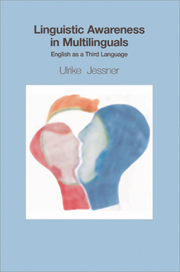Book contents
- Frontmatter
- Contents
- List of figures and tables
- List of abbreviations
- Acknowledgements
- Introductory remarks
- 1 Multilingualism with English
- 2 Learning and using a third language
- 3 On the nature of linguistic awareness
- 4 Exploring linguistic awareness in third language use
- 5 Crystallizing linguistic awareness in multilingual education
- 6 Envoi
- References
- Index
1 - Multilingualism with English
Published online by Cambridge University Press: 05 September 2013
- Frontmatter
- Contents
- List of figures and tables
- List of abbreviations
- Acknowledgements
- Introductory remarks
- 1 Multilingualism with English
- 2 Learning and using a third language
- 3 On the nature of linguistic awareness
- 4 Exploring linguistic awareness in third language use
- 5 Crystallizing linguistic awareness in multilingual education
- 6 Envoi
- References
- Index
Summary
Multilingualism is a growing phenomenon and certainly not an aberration – as many, in particular monolingual speakers, may still think – but a normal necessity for the world's majority. Such a monolingual perspective, or ‘linguistic myopia’, is often part of those speaking a powerful language of wider communication and is frequently accompanied by a narrow cultural awareness reinforced by state policies which in many cases elevate only one language to official status (Edwards 1994: 1). Among the different reasons leading to multilingual settings one could say three are dominant, that is (1) the increasing mobility resulting in migratory movements, (2) the role of English as a lingua franca and (3) the presence of former colonial forces.
The first chapter of the book concentrates on the sociolinguistic aspects of multilingualism, which are seen to develop in parallel with the changing status of English. Our focus on ‘multilingualism with English’, as Hoffmann (2000) termed it, will move from a global to a Europeancentred perspective where the status and characteristics of English as a third language, which in many cases is linked to its role as a lingua franca, will be concentrated on. Although the main focus of this book rests on the psycholinguistic study of third-language use, the interdependency between linguistic conditions on the societal level and the individual use and knowledge of languages needs to be emphasized. Therefore the closing section will address some issues which are relevant for both socio- and psycholinguistic aspects of the study of the multilingual individual.
- Type
- Chapter
- Information
- Linguistic Awareness in MultilingualsEnglish as a Third Language, pp. 1 - 12Publisher: Edinburgh University PressPrint publication year: 2006



